Have you ever wondered why work in the Internet age is still so tedious? Why are we still filling out forms, clicking buttons, and manually searching for information? When AI can write code, draw pictures, and even think about complex problems, why are we still trapped in web interfaces, performing repetitive tasks like robots?
I found a very interesting phenomenon. More and more friends around me are discussing how to let AI help them complete various tasks on the Internet, such as automatic renewal services, regular report downloads, monitoring competitor prices, etc. Everyone has the same confusion: AI looks smart, but why can't it help me complete these simple tasks directly on the website? The answer to the question is actually very simple. AI needs a "browser" to operate the website like a human. And this is exactly the core problem that Browserbase wants to solve.
Recently, this company, which was founded only 16 months ago, has just completed a $40 million Series B financing, with a valuation of $300 million. Notable Capital led the round, with participation from well-known investment institutions such as Kleiner Perkins and CRV. Even more impressive is that the company raised a total of $67.5 million in 15 months, growing from nothing to more than 1,000 customers. This speed of development made me think seriously: what kind of problems are they solving, and why are so many companies willing to pay for it?
Re-understanding the essence of web automation
In my opinion, Browserbase is solving a seriously underestimated but extremely important problem: how to enable AI to use the Internet like humans. We are now living in a strange era. AI can write complex code, but it can't help you book a flight on the website. The root of this contradiction is that the existing Internet infrastructure is designed for humans, not for AI. Every website has its own interface, buttons, and forms. AI needs to understand the meaning of these elements and operate them correctly, just like humans use a mouse and keyboard.
The solution provided by Browserbase is called "headless browser" infrastructure. Simply put, it is a browser running in the cloud. They have no user interface but can perform all the functions of a browser: visit web pages, click buttons, fill out forms, download files, etc. The key is that these browsers can be programmed, can run at scale, and are optimized for AI and automation scenarios.
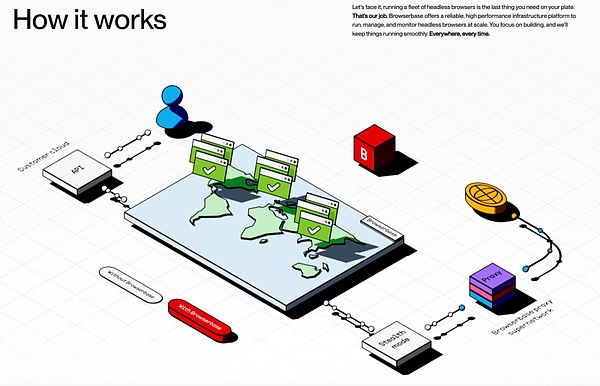
The background of founder Paul Klein made me think that he was the right person to solve this problem. He worked at Twilio for three years, from intern to team leader, and experienced the entire process of the company's IPO. Later, he co-founded Stream Club, a live broadcast software tool company, which was eventually acquired by Mux. During his time at Mux, Klein was exposed to headless browser technology a lot, which gave him a deep understanding of the pain points and opportunities in this field. When ChatGPT became popular, more and more people asked him how to use headless browsers to support AI applications, which made him realize that there was a lack of a professional infrastructure platform in the market.
More importantly, Klein has a unique understanding of this problem. He believes that we should not expect the Internet to be redesigned for AI, just as we cannot expect all roads to be repaved for self-driving cars. Instead, we need to let AI learn to use the existing Internet infrastructure. This view touched me deeply, because there are indeed too many old but important websites that will never provide API interfaces, such as government department websites, traditional enterprise internal systems, various professional databases, etc.
From a technical point of view, Browserbase's architectural design is very interesting. Their platform can start thousands of browser instances in a fraction of a second, each of which is equipped with four virtual CPUs to ensure fast response. More importantly, they have deployed data centers around the world, and developers can send requests from the nearest data center, greatly reducing latency. This global deployment is crucial for applications that need to access websites in different regions, such as monitoring overseas market prices, collecting international news information, and so on.
Transformation from infrastructure to ecosystem
What impressed me was that Browserbase not only provides infrastructure, but also builds a complete ecosystem. They developed the Stagehand framework, an open source tool designed specifically for browser automation. Compared with traditional Puppeteer and Selenium, the biggest feature of Stagehand is that it can combine traditional scripts and AI agents in the same workflow. This design is very smart because it solves a key contradiction: traditional scripts are reliable but not flexible enough, and AI agents are flexible but may have hallucinations. By allowing developers to use AI where adaptability is needed and scripts where high reliability is needed, Stagehand achieves a balance between the two.
What excites me even more is their newly launched Director product. This product shows me the ambition of Browserbase: they not only want to serve developers, but also want ordinary users to use Web automation. Director allows users to describe the tasks they want to accomplish in natural language, and then automatically generates executable browser workflows. For example, you can tell Director: "Go to the California Nursing License Database, look up Julia's license number 94156, and tell me if her qualifications are valid." Director will automatically generate the corresponding code and perform this task.
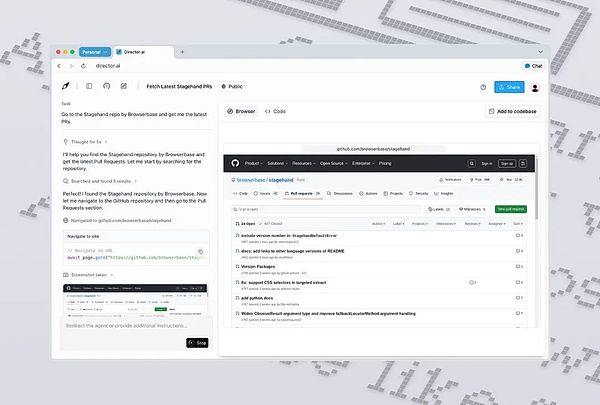
Klein mentioned an interesting concept: "vibe coders". These are people who have a certain technical background but are not professional developers, such as dentists, lawyers, small business owners, etc. They know what Cursor is, understand AI tools, and want to automate some workflows, but don't want to learn programming from scratch. Director is designed for these people. Klein said that he often receives calls from dentists asking how to automate the operation of insurance portals. This made me realize that the demand for web automation is actually much wider than I thought.
This design concept reminds me of Vercel's v0 or the development path of other no-code platforms. Browserbase is essentially lowering the threshold for web automation, allowing more people to enjoy the efficiency gains brought by automation. Moreover, the code generated by Director can be easily handed over to engineers for further development, which provides a good proof-of-concept tool for enterprises.
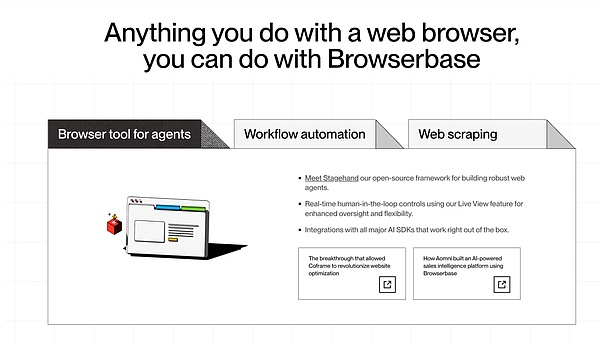
I particularly appreciate Browserbase's commitment to open source. They have an engineer full-time responsible for open source projects and sponsor projects such as ScrapegraphAI. According to Klein, tools supported by Browserbase are downloaded 1.3 million times per month on GitHub. This open source strategy not only helps them build a developer community, but also allows their technology to be more widely verified and improved.
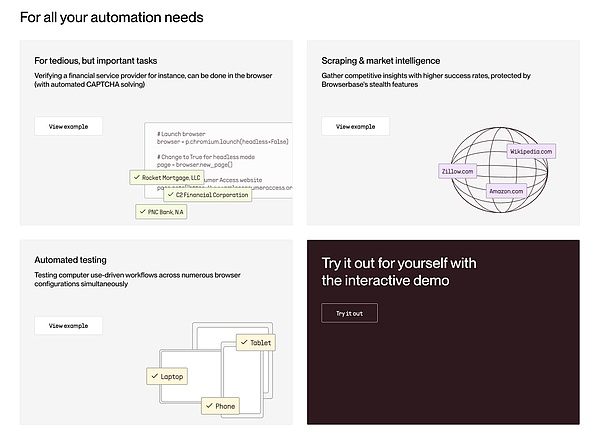
What impressed me was Browserbase's investment in customer service. Klein said that their customer engineering team are all highly educated engineers, including graduates from Columbia University and Harvard University. These people are not customer service staff in the traditional sense, but experts who can really help developers solve technical problems. Their core indicator is to help customers put products into production as soon as possible, rather than simple response time.
From a business model perspective, Browserbase adopts usage-based pricing, which means that they can only make money when customers are successful. This aligned business model allows Klein to spend a lot of time helping customers succeed, including providing product release suggestions, usage feedback, and so on. This deep involvement in customer success makes me feel that they are more like technical partners of customers rather than just service providers.

Founder's Deep Thinking: Entrepreneurial Philosophy from Frustration to Enlightenment
Paul Klein's entrepreneurial journey showed me the depth of thinking of a mature entrepreneur. He comes from a family with a strong business tradition. His grandfather started at night school and eventually became an executive at National Cash Register, and later worked in corporate transformation. This family background gave Klein a unique understanding of business. The most interesting thing is that when he invited his grandfather to the B round financing celebration party, the old man said: "That's great, I appreciate it, but I prefer to only attend the IPO party. Call me then." This high standard made Klein realize that it is indeed much easier for entrepreneurs now than before.
Klein’s first entrepreneurial experience, Stream Club, taught him an important lesson. “I started that company for the wrong reasons,” he says candidly. He had worked at Twilio for three years, from intern to IPO, and then stayed to lead the team. One day, he disagreed with the technical lead on a major architectural decision, and when he got home, he happened to get a text from his future co-founder asking if he would like to work on a project together over the weekend. They built a great product called Stream Club. But Klein reflected, “I started this company because I like to build, I like the idea of entrepreneurship, and I want to see what I can do. But I don’t have any differentiated view on the live broadcast market.”
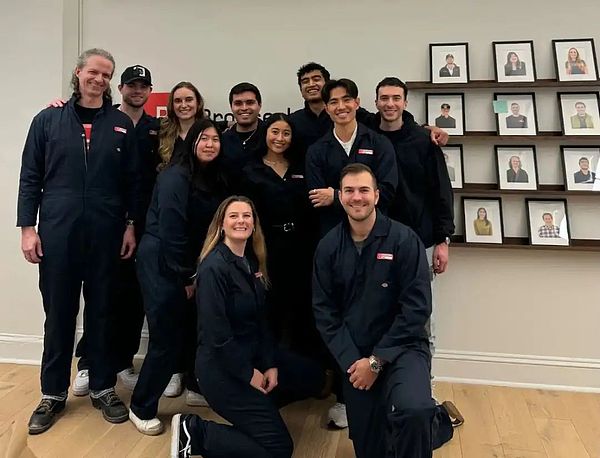
This honest self-reflection impressed me. Klein said that people who start companies because they want to experience entrepreneurship often have a hard time because they don't have a deep emotional connection to the product they build to push them through the hard times. "You'll see what it's like to start a company - it's very difficult. Building a company is very painful, you'll lose your hair, you won't exercise as much, your life will never be the same, you won't see your friends as often," he said. This candid description of the reality of entrepreneurship is more valuable than those glamorous success stories.
The exit of Stream Club gave Klein time to reflect on why he started a business. He realized that you should only start a business when no one else is building what you need and you are the right person to build it. While working at Mux, he spent a lot of time on browser automation and headless browser technology, and gradually formed a strong opinion on this infrastructure. When AI and AI agents emerged, more and more people asked him how to use headless browser technology. After the 20th such conversation, he realized that no one was building the infrastructure to help these people automate the network, and it needed to be done by him.
Klein's perspective on solo entrepreneurship was also very inspiring. "I didn't become a solo founder by choice," he said. "I tried to get three people to be my co-founders and they all said no." But in the end he found that it was better this way. As a solo founder, you eliminate the alignment step between co-founders. When there are multiple co-founders, the founders must align with each other first, and then with the rest of the company. As a solo founder, it's you and the company that are in constant harmony. If he feels the direction of the company is not aligned with him, he can call an all-hands meeting to realign.
I especially appreciate Klein's understanding of pressure. He said, "Pressure is a privilege," a concept that comes from the slogan of the US Open tennis tournament. He explained, "When you feel customer pressure, investor pressure, or pressure from the world, it means you are doing the right thing, it means you have a chance to build something, and people are relying on it." This way of thinking, which reframes pressure as opportunity, is a valuable psychological tool for any entrepreneur.
Klein's team-building philosophy also reflects his deep thinking. Browserbase insists on building an on-site team in San Francisco, working in the office five days a week. Although this seems to be against the trend in the era of remote work, Klein has his own logic: "On-site recruitment creates a higher threshold. Candidates must be willing to commit to working here 40-60 hours a week." He believes that this approach has cultivated a strong culture and attracted top talents who are truly invested in Browserbase's vision. More importantly, they hired a lot of former founders. "They understand. They understand the pressure and risks. When they came, they were already aligned with what we were building."
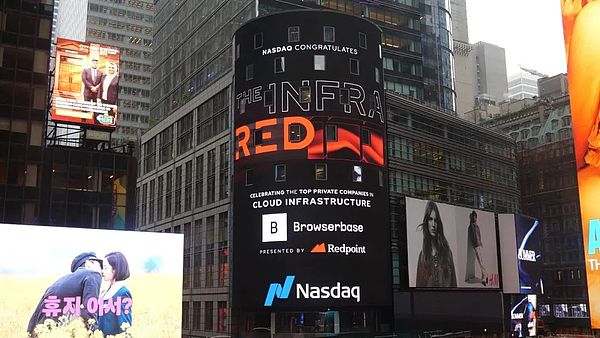
What impressed me most was their emphasis on "emotional vulnerability." “We’re an emotionally vulnerable company,” Klein says. “We recently did an exercise in our all-hands meetings where everyone took turns talking about one thing they screwed up recently.” This openness builds trust and encourages risk-taking. An engineer says, “Hey, I triggered a bug that broke production, and it really made me question whether I’m a good engineer?” Instantly everyone can say, “No, you’re a great engineer, what were you thinking?” But the cultural depth of being able to identify these little insecurities and validate them, and then push people to continue taking risks, is rare.
Market Depth Revealed by Real Customer Stories
Diving into Browserbase’s customer stories, I discovered that the market is much deeper and more diverse than I initially thought. Each story revealed an overlooked but extremely important automation need in modern business.
The Pursuit story opened my eyes to the huge and complex market of government procurement. Co-founder and CTO Brandon Max told me that when they first met Klein, Pursuit had just spent a lot of time and effort building its own computing cluster to scrape data from public-sector websites, looking for indicators of upcoming contracts and which departments had budgets. "It really sucks to scrape and run this yourself," Max told Klein. A few months later, Pursuit turned to Browserbase, which now scans more than 130,000 websites representing cities, counties, universities, fire districts, and more. Pursuit then combines this information with a large number of Freedom of Information Act requests submitted for purchase orders to generate confidence scores for salespeople, letting them know who to contact best and how to contact them. "This data is required by law to be public," Max emphasized. "We think that making government better at a cheaper price is better for where our children grow up." This case made me realize that automation is not just for efficiency, but also to promote government transparency and fair competition.
Even more surprising is the story of that 55-year-old dairy trucking company. The company, which had never hired an engineer in its entire history, just hired their first one this year. This engineer used Browserbase to automate the job of collecting gas prices along a route. Before, they had an operations person who would say, "Okay, you're going to take this route, and this is where you stop to get gas." Now they built an AI assistant that can find gas prices based on your route and tell you where you should get gas. "This was all done by this one engineer doing vibe coding using Browserbase," Klein said. "That case showed me that AI has really escaped the Silicon Valley bubble, and people are building agents in the middle of the United States, internationally."
Structify's use case shows how capable Browserbase is at handling large-scale data projects. Co-founder Ronak Gandhi said his startup uses Browserbase to help put together large project sprints that can run up to a decade of browser hours in a single day. The scale is amazing, but more importantly, Gandhi praised the responsiveness of the Browserbase team. He said that when Structify has a big data push, they reach out to Browserbase’s head of technology, Walker Griggs, on Slack to have him personally coach them through these moments. This kind of personalized technical support is rare among infrastructure companies.
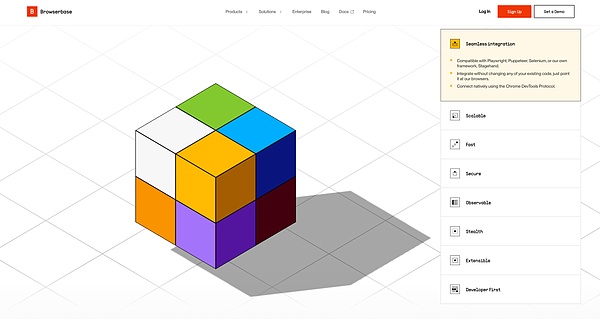
What interested me most was the dentist case mentioned by Klein. He said, "We keep hearing about professionals trying to automate a niche but repetitive task. This dentist booked a call with us and said they wanted to use AI to automate their insurance portal. That’s when it occurred to me that we need to make our product more accessible." This insight led to the launch of Director. Imagine a dentist being so frustrated with dealing with insurance authorizations that they’re willing to learn to use headless browser technology to automate the process. This shows how severe the pain points in existing business processes are, and how widespread the need for automation is.
Klein also shared a specific use case about Kalshi, the first federally regulated prediction market platform in the United States. "You can tell your agent to go to Kalshi, find the interest rate market, and bet $50," he explained. "This interaction requires reading, clicking, and filling out forms on a web page, which is exactly what Browserbase is built for." This example is interesting because it shows how AI agents can interact with complex financial platforms, which may be very difficult or impossible to achieve with traditional API integrations.
From these cases, I see several important trends. The first is the prevalence of the "last mile" problem. A lot of valuable data and functionality are locked in traditional websites without modern APIs. The second is the importance of "long tail demand". Every industry has its specific, seemingly niche but actually critical automation needs. The third is the trend of "skill democratization". As tools become easier to use, non-technical professionals are also starting to build their own automation solutions.
More deeply, these cases reveal the problem of "hidden friction" in the modern economy. There are too many business processes that still rely on humans to perform repetitive network tasks, not because these tasks are complex, but because there is a lack of suitable tools to automate them. Browserbase is filling this gap, allowing enterprises to focus on higher-value activities.
One observation by Klein is particularly insightful: "Most of our customers are actually people who have built this themselves. We really hit the pain point. People who built and maintained this technology stack themselves will say: 'Screw it! I don't want it.'" This shows the maturity of the market and the authenticity of the demand. These are not customers who have been persuaded by marketing, but professionals who have tried to solve the problem themselves and found it difficult.
Thoughts on the Future of Web Interaction
From a broader perspective, I think Browserbase represents an important direction in the evolution of Web interaction. We are at a turning point where traditional click-based user interfaces are giving way to intent-based interactions. Users no longer need to know "how" to complete tasks, they just need to express what tasks they "want" to complete. This shift is as significant as the leap from command line to graphical interface.
Klein mentioned a very important point: authentication is the key bottleneck for large-scale application of AI agents. If you want AI to help you book a flight, it needs to log in to your airline account. But sharing passwords with AI is obviously not the best way, and most websites do not have a dedicated authentication system designed for AI agents. This problem needs to be solved by authentication service providers like Okta and Clerk, who need to provide some kind of "proxy authentication" function so that AI can perform operations securely on behalf of users.
I am also thinking about the ethical issues of web scraping. Although Klein emphasized that Browserbase focuses mainly on automation rather than crawling, the reality is that many customers are indeed using their services to collect network data. This is a complex issue because, on the one hand, a lot of data should be public according to legal requirements; on the other hand, large-scale automated collection may be a burden on websites. Browserbase's practice is to review the use cases of all large-scale customers, and this "know your customer" (KYC) due diligence may exceed their legal obligations.
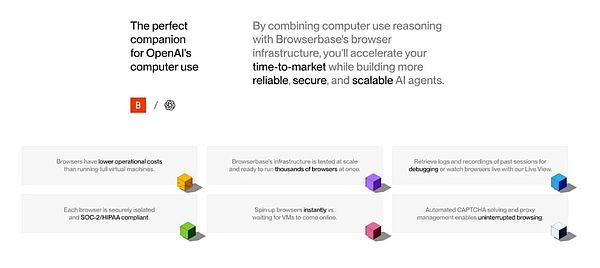
From the perspective of technological development, I think we are entering an era where "non-human Internet users" appear in large numbers. Traditional verification codes (CAPTCHA) are designed to stop malicious robots, but now we need to distinguish between "good robots" and "bad robots." This may require more complex authentication and intent verification mechanisms.
I am also curious about how standardized protocols such as Model Context Protocol (MCP) affect this ecosystem. MCP is a standardized way for developers to expose tools such as browser control to AI agents as callable functions. This standardization may make web automation more popular and easy to use.
Market competition and development prospects
From an investment perspective, Browserbase's rapid growth and high valuation reflect the market's confidence in this track. Glenn Solomon of Notable Capital compared Browserbase to Vercel, arguing that if you can build an excellent service that can foresee and meet the needs of developers, then this will be a very attractive value proposition. Growing from zero to more than 1,000 customers in just 16 months is a speed rarely seen among infrastructure companies.
In terms of competition, I noticed that Perplexity acquired the web browser startup Comet this year, indicating that large AI companies are also paying attention to this field. But Klein believes that competition from model providers is not a major threat at present because Browserbase focuses on infrastructure and developer tools rather than direct consumer applications.
I think Browserbase's moat comes from several aspects: first, the depth of technology, especially the expertise in large-scale browser operation and optimization; second, the developer ecosystem, the network effect formed through open source projects and community building; and finally, the quality of customer service, the loyalty established through deep involvement in customer success.
From the perspective of market size, I think this market is far from saturated. The concept of "vibe coders" mentioned by Klein is particularly interesting because it represents a huge potential market: people who have a certain technical understanding but are not professional developers. As AI tools become more popular, the size of this group will become larger and larger, and their demand for automation tools will become stronger and stronger.
I am also optimistic about Browserbase's potential for development in vertical industries. From dentists to dairy transport companies, from government procurement to data collection, various industries have a large number of repetitive web operations that need to be automated. These needs are often very specific and professional, requiring specialized solutions. As an infrastructure platform, Browserbase can support the development of various vertical applications.
Enlightenment for the Entire Industry
Finally, I want to share some thoughts about the entire industry. The success of Browserbase has made me see the value of "boring tech". Browser automation doesn't sound as exciting as AGI or autonomous driving, but it solves real and urgent problems. Many times, the most successful technology companies are those that focus on solving specific problems, rather than those that pursue the most cutting-edge technology.
An analogy that Klein often mentions is very interesting: Browserbase is like Twilio to phone calls and Stripe to payments, it is the infrastructure for web automation. This "pipe and shovel" business model is often the most stable and valuable in a technological revolution. When everyone is digging for gold, the person who sells shovels often makes the most money.
I also see the importance of open source strategy from the development of Browserbase. They not only open source their own tools, but also actively participate in and sponsor the open source community. This strategy not only helped them build their technical reputation, but also enabled them to get feedback and contributions from the community. In the developer tool space, open source is almost a must for building trust and community.
From a financing perspective, I think Browserbase has shown a good financing rhythm. They completed four rounds of financing in 15 months, each with clear milestones and usage plans. This rapid and orderly financing allowed them to seize opportunities during the market window while avoiding excessive dilution.
Finally, I think the story of Browserbase tells us that in the AI era, the infrastructure and tool layer may be more important than the application layer. Every revolutionary technology needs supporting infrastructure to support it. Just like cloud computing needs AWS and mobile applications need App Store, AI applications also need infrastructure like Browserbase to connect virtual intelligence and the real world. I believe that as AI agents become more popular, web automation will become a multi-billion dollar market, and Browserbase is likely to become an important player in this market.
 Catherine
Catherine














